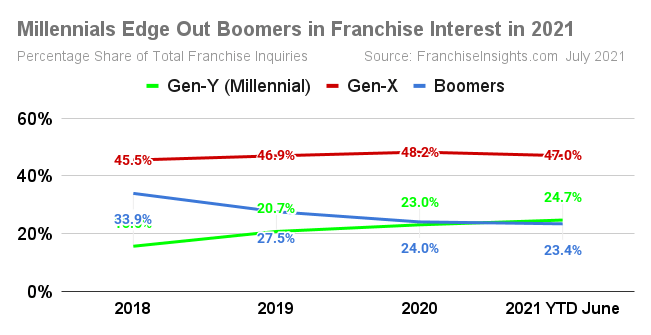Millennials in Franchising
Baby boomers won’t dominate the franchise world for much longer.
As more and more boomers reach retirement age, it makes way for a wave of millennials looking for a different path outside the conventional 9-to-5 rat race. Let’s take a look at what the franchise landscape looks like for the new generation in line for franchise dominance.

A growth surge for millennials in franchising
Franchising is emerging as a compelling career possibility for millennials, perhaps even more so than previous generations.
The rise in millennial participation in franchising is noteworthy, with a significant increase of 163% in millennial franchise owners since 2022, as per Guidant’s 2023 Small Business Trends study. This surge indicates a growing interest among millennial entrepreneurs in franchising opportunities.
The franchise industry itself is on an upward trajectory. According to the International Franchise Association’s 2023 Economic Outlook, the number of franchise establishments is expected to grow by almost 15,000 units in 2023. This growth is not just in numbers; it’s also about the economic impact. The total output of franchised businesses is projected to increase by 4.2% to $860.1 billion in 2023.
Interestingly, the franchising sector is not only expanding but also diversifying—and millennials are an extremely diverse generation.
The Guidant study revealed a rise in diversity among franchise owners, with notable increases in minority franchise ownership. The study also highlighted that 77% of franchisees chose to open a new location, reflecting confidence in franchisor support and proven business models.
The appeal of franchising for millennials can be attributed to several factors. Franchising offers a relatively lower barrier to entry compared to starting a business from scratch, and it often comes with substantial support in terms of business plans, advice, mentoring, and coaching.

Millennials edged out boomers in franchising back in 2021.
This support system, coupled with a proven business model, provides a higher chance of success, making franchising an attractive option for millennials looking to enter the world of entrepreneurship.
In summary, franchising presents a viable and promising career path for millennials, offering business opportunities with growth, diversity, and profitability even in challenging economic times. The combination of increasing millennial interest, sector growth, and the supportive nature of franchising models underscores the potential of this path as a career choice for the younger generation.
How millennial values suit franchising
Franchising has emerged as a highly suitable career path for millennials, aligning well with their values and aspirations.
One key aspect of this compatibility lies in the desire for independence and entrepreneurship. Millennials often seek opportunities that allow them to be their own bosses and exercise creative control over their careers. Teamwork is still important, but being able to pursue their own ideas is crucial.
On top of that, millennials value the following when choosing a career:
- Work-Life Balance: Millennials place a high value on achieving a healthy work-life balance. They seek careers that allow them to have time for personal pursuits, family, and leisure activities, rather than being constantly tied to their jobs.
- Purpose and Meaning: Many millennials seek careers that align with their personal values and offer a sense of purpose. They are often drawn to organizations and roles that contribute to social and environmental causes or allow them to make a positive impact on society.
- Flexibility and Autonomy: Millennials value flexibility in their work arrangements. They appreciate the ability to work remotely, have flexible hours, and make decisions independently, which can enhance their work-life integration and creativity.
- Professional Development and Growth: Millennials are keen on continuous learning and development. They look for employers who offer opportunities for skill enhancement, career advancement, and a clear path for growth within the organization.
- Inclusive and Diverse Workplaces: Millennials prioritize diversity and inclusion in their workplace. They seek environments that are welcoming, inclusive, and promote diversity in terms of race, gender, sexual orientation, and background, as they believe this fosters innovation and creativity.
Franchising provides just these values, offering a proven business model and brand while allowing millennials to run their own branch with a degree of autonomy.
This combination of structure and freedom resonates with millennials, who value self-determination and the chance to shape their professional destinies.
The sustainability initiative is huge, too. Regardless of what tops the list of any specific individual, the large range and variety of franchise opportunities are sure to resonate with the values listed above.
Advantages in franchising for millennials
Owning a franchise presents several appealing opportunities for millennials, especially in the modern, dynamic business environment.
Key advantages include:
- Low-Cost Entry and Flexibility: Many franchises offer low-cost entry points, like Tutor Doctor, making them accessible for young business owners. They often don’t require inventory, extensive build-outs, or leases, allowing for quicker startup and cash flow. This is particularly advantageous for millennials who may not have extensive capital or are seeking to avoid significant financial risks.
- Alignment with Millennial Values: Franchises like Oxi Fresh Carpet Cleaning appeal to millennials through their environmentally-friendly practices and tech-based models, aligning with the values of sustainability and technological integration that many millennials hold dear.
- Built-in Support and Infrastructure: Franchises come with established support systems, reducing the risks associated with trial-and-error in business. This support includes training and an existing business model, which can be particularly valuable for those new to business ownership.
- Flexibility and Independence: Many franchise opportunities allow for flexible scheduling and the ability to set your own pace, which is highly valued by millennials who often seek a better work-life balance.
- Connection with Younger Markets: Millennials, being closer in age to younger consumer demographics, can have an edge in understanding and connecting with these markets, which is beneficial for businesses targeting younger customers.
However, it’s important to also consider some potential disadvantages, and franchising doesn’t necessarily guarantee success.
For instance, franchise brands can sometimes offer less freedom compared to starting your own business, as the franchise model requires adherence to established systems and practices.
Also, there might be initial franchise fees and ongoing royalties to consider.
Fibrenew is values-driven and always on the cutting edge
Having a positive impact on the environment, the community, and the brand is compulsory for the success of every member of the Fibrenew family. If you’re also tech-savvy, driven, and ready to put in the hard work, we’d love to hear from you.
These are the values that keep us successful at Fibrenew, so get in touch if a career where unlimited earning potential and protecting the planet and community go hand in hand sounds like a dream come true to you. Stay tuned!
Millennials in franchising FAQ
What is franchising and how does it appeal to millennials?
Franchising is a business model where a brand (franchisor) allows individuals (franchisees) to use its trademarks, products, and business strategies in exchange for a fee. Millennials are attracted to franchising due to its entrepreneurial nature, built-in brand recognition, and support structures, which reduce the risk associated with starting a business from scratch.
Why are millennials interested in franchising?
Millennials often seek meaningful work, flexibility, and a balance between work and life. Franchising offers the opportunity to be their own boss, pursue their passions, and maintain a desirable lifestyle, all while benefiting from the support and resources of an established brand.
What types of franchises are popular among millennials?
Franchises that resonate with millennial values, such as sustainability, technology, health and wellness, fast-casual dining, and innovative retail concepts, tend to be popular. Additionally, franchises that offer flexibility, like home-based or mobile operations, are also attractive.
How do millennials finance their franchise investments?
Financing options include traditional bank loans, Small Business Administration (SBA) loans, franchisor financing programs, crowdfunding, and personal savings. Millennials also often leverage partnerships or investor groups to raise capital.
What challenges do millennials face in franchising?
Key challenges include securing financing, as millennials may have limited capital and credit history. Adapting to the structured nature of franchising can also be a challenge, as it requires adherence to established systems and procedures.
How tech-savvy nature of millennials benefits their franchise business?
Millennials’ comfort with technology and social media can be a significant asset in digital marketing, online customer engagement, and leveraging modern business management tools, giving them an edge in efficiently running and promoting their franchise.
Are there any specific training or support programs for millennial franchisees?
Many franchisors offer comprehensive training programs covering business operations, marketing, financial management, and technology use. Some may also provide mentorship opportunities and peer networking groups specifically tailored to younger franchisees.
How can millennials ensure success in franchising?
Success in franchising for millennials involves thorough research, choosing a franchise aligned with their values and interests, and leveraging their strengths such as adaptability, tech-savviness, and innovative thinking. Continuous learning and effective use of franchisor support are also crucial.
What is the impact of millennials on the future of franchising?
Millennials are shaping the future of franchising by bringing new perspectives, innovative ideas, and a strong emphasis on technology and sustainability. Their influence is driving franchises to adapt and evolve in ways that align with changing consumer preferences and technological advancements.
Where can millennials find more information and resources on franchising?


